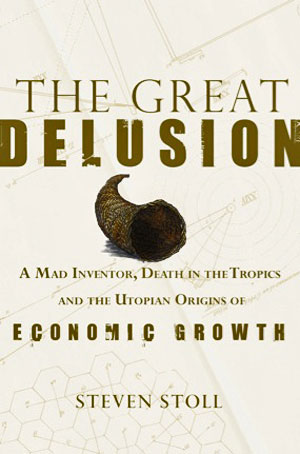
The Great Delusion is about the unrealistic expectations we all have about what this tired and picked-over planet can provide us. It is about economic growth, the belief that a society can—even that it must—increase in wealth and population without end. I think that growth as we know it entered the American imagination in the 1840s—at the moment when an older faith in progress met the capacity to manufacture things on a large scale. Just watching steam engines made people think that energy and matter could be appropriated into this new system without end. Material progress became a popular expectation and, in time, a government policy. But the book is also a biography. I pin all of these ideas—and many more having to do with energy and resources—to an obscure German engineer named John Etzler. Why? Because Etzler took the most rational scientific ideas of his time and formulated them into a scheme to create infinite wealth with infinite energy for a world population that he hoped would top one trillion in his lifetime. The point is that if Etzler was crazy, so are we. Our presidential candidates might not use words like “infinite abundance,” but when they talk about prosperity without regard to planetary limits, when they promote growth as the cure for income inequality, they participate in the very same delusion.
“if going to Costco seems anything but a journey into utopia, consider that the plenty it offers every day (for low unit prices) differs hardly at all from what utopian writers promised during the 1840s.”
My first thinking about growth and capitalism came from teaching the environmental history of the Atlantic World. Markets are central to the changes of the last 400 years. But in example after example, when an animal or a forest or a stretch of farmland became attached to market demand for the first time, it was nearly wiped out. I got tired of teaching this to students without exploring the assumptions about nature that lay beneath these examples. I wrote The Great Delusion to find some answers. The book also came from a specific experience—the 1996 Vice-Presidential debate between Al Gore and Jack Kemp, in which Kemp exclaimed, “We should … double the size of the American economy!” I thought about it for days afterwards. When, years later, I cast about for a subject related to the economy, Kemp’s strange outburst came back to me.
The book is good background for the present financial crisis on Wall Street and the likely future of the world economy. As much as speculation has made billions of dollars for brokerage firms and investment banks, the implosion of such major firms as Lehman Brothers makes clear that wealth really does have a material basis—in the actual price of actual houses on actual hillsides. The latest panic is not just the result of bad loans and the shifting value of the housing market but of an attempt to create bloated value from bloated value. The recession itself, as everyone knows, cannot be separated from the cost of food and petroleum. Living with scarcity does not mean living in poverty—far from it. It does mean changing our expectations about how we will live. That, in the end, is what The Great Delusion is about.
As for me, I am new to the critique of capitalism. I did not grow up in a radical household, nor did I have any reason to doubt that economic growth made life better for people. But at a certain point in my education I became fascinated with where things came form, who made and grew the raw materials that made my existence possible, and how stuff flowed through the economy. I also have this visceral feeling of scarcity—that everything exists in limited quantities. The long view of things is great for correcting any faith in infinite abundance. Industrial society is about 250 years old. There are Pacific sea turtles nearly that old. And yet in that time we’ve deforested the temperate latitudes, changed the climate, and endangered thousands of species.
Start at Chapter One and read about the Satellite, Etzler’s mysterious machine, a cross between a plow and the Batmobile. The Satellite encompasses Etzler’s entire scheme, all his knowledge of physics and geology, and the hope that the physical forces of the Earth could be captured, liberating industrial workers from poverty wages and factory discipline. Etzler styled himself a utopian socialist like the many others who wrote and lectured during the 1840s, but he rejected politics. Instead, he believed that technology—in the form of his Satellite and other inventions—along with the inherent resources and energies of Earth (wind, sun, and ocean tides) would bring about a revolution beyond the imaginations of Robert Owen, the English utopian, and François Marie Charles Fourier, the French socialist who exerted the greatest influence on Etzler. All would happen without social conflict. In effect, Etzler spoke the same line as Jack Kempt—doubling the economy would create wealth, eliminating the need for its redistribution.
All of these hopes took the odd form of the Satellite, a machine that Etzler claimed could perform every landed task—digging mines, planting seeds, cutting trees, and more. It did this while generating all its own power and could be operated by two people. The leaders of the Tropical Emigration Society hosted a trial for the Satellite in 1845, in which 800 people gathered in a field outside Oxford, England. The much anticipated colony in Venezuela, the trust and hopes of thousands of working-class members, and Etzler’s authority all depended on the machine.
“Etzler took the most rational scientific ideas of his time and formulated them into a scheme to create infinite wealth with infinite energy for a world population that he hoped would top one trillion in his lifetime. The point is that if Etzler was crazy, so are we.”
The final chapter of the book brings the argument up to the present. I wrote The Great Delusion for another reason. I have been deluded myself, and never more so than when I go to Costco. Costco hangs in the background of the entire book, not because of any policy of its management but because of the enormous statement it makes about consumption and abundance. Everything comes in giant quantities, from all parts of the world, and the stock is replenished hourly. Standing at the door, it is possible to watch schools of salmon, forests of Douglas fir, barrels of petroleum, acres of corn and wheat, and appliances that will siphon off untold kilowatt hours of electricity pass out into the parking lot and from there into the households of southern Connecticut. It bothered me—a lot. And if going to Costco seems anything but a journey into utopia, consider that the plenty it offers every day (for low unit prices) differs hardly at all from what utopian writers promised during the 1840s. We would all have whatever we wanted; in fact, the dream commodity of the future for Ralph Waldo Emerson consisted of factory-baked bread. As I say in the book, Etzler did not promise a world to come but the world that came.


Steven Stoll is Visiting Associate Professor of History at Fordham University and the author of books on California, environmentalism, and the early republic. His writing has appeared in Harper’s, Lapham’s Quarterly, The New Haven Review, and most recently in The Chronicle of Higher Education in an essay on the Wall Street financial crisis.